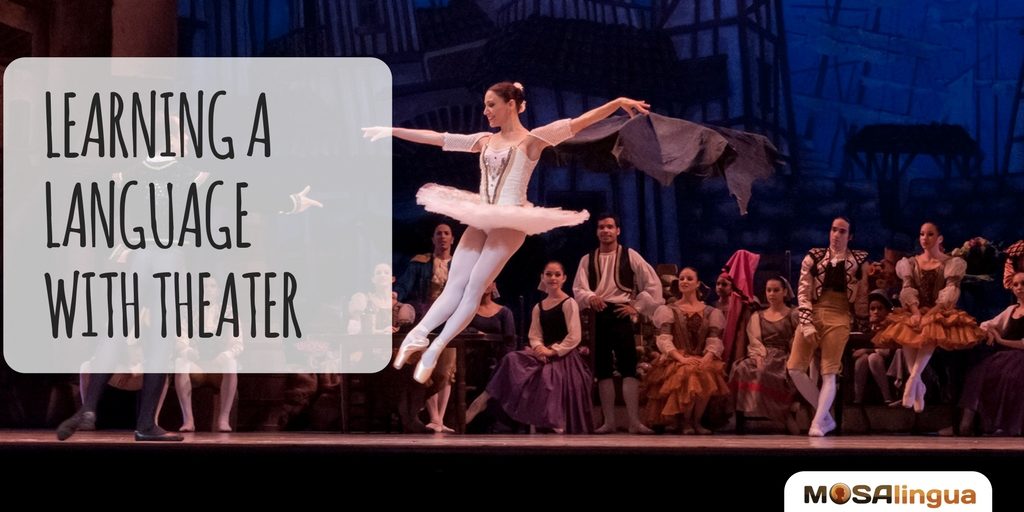 Don’t you feel that something sounds fishy about the term “a living language”?
Don’t you feel that something sounds fishy about the term “a living language”?
When we learn a language in school, there’s nothing lively about it. We learn vocab, conjugation, how to write, but we don’t necessarily learn how to put it into use. The language is often at the mercy of the student’s speaking it. But when you’re learning a language, you have to speak it!
There is the whole idea of learning a language with theater. The objective is to simply learn the language with a communicative approach. We learn by action.
After discovering the concept of using theater to learn a language, we are a little more enlightened on the topic and have focused today’s article on unveiling all its benefits.
Why Learn a Language with Theater?
Learning a language is child’s play
Drama is a British approach to education based on theater. As a new learning method, it relies on theatrical techniques and is especially employed in foreign language instruction. Thanks to the emergence of associations such as Language on Stage, which has also obtained approval through the French Education Ministry in 2012, this method is becoming commonplace in more and more primary and secondary schools across the country.
The goal of the association: Help primary schools implement, with the help of the teachers and students of course, a theater project. A thespian, generally a native of the language of instruction or at least bilingual, and the teacher determine the theme of the project. Drama is becoming a full-fledged educational tool.
The Advantages of Becoming an Actor for Learning
Learning languages with theater offers as many linguistically advantages as they do artistic advantages.
- This method allows you to learn while having fun and to downplay language learning, making it less formal. In school, this is much more entertaining than listening to your professor repeat the same thing 100 times over.
- Thanks to drama, students develop crucial skills for learning a new language. Skills like listening, curiosity, attention, memorization and especially…
- … self-confidence! We often say that the worst enemy of language learning is shyness since you need to break out of your shell and begin speaking in order to master another language. One of the advantages of learning a language with theater is that it teaches you how to conquer this shyness. In you want to speak in front of dozens of people, you need self-confidence.
- It encourages creativity, allowing you to jump into various situations. According to the chosen theme, you will discover, implement and subsequently learn new vocabulary.
- From a technical point of view, this method allows students to quickly pick up the correct accent and intonations. Their ears will become familiarized to correct pronunciations, which they will correctly pronounce in turn.
- Theater allows you to simply, and truly, bring a (“living”) language to life.
The only requirement: Learning is based upon the student’s level of motivation.
Learning a Language with Theater with MosaLingua
It’s true that most of us are well past the age of exploiting this method, since it’s especially becoming prominent in primary schools. Still, there is nothing stopping you. There are also theater workshops created for adults, which will introduce you to a new language and a cultural activity as well.
And even if these workshops might not fully teach you a new language, you can take it a step further. The MosaLingua applications use vocab lists tailored to various situations: eating, lodging, commuting, tourism, recreation, etc. A new learning method for you may consist of learning these lists and then searching for situations where you can put them to use and exchange with friends.
This allows you to both learn new vocab and gain self-confidence. In other words, this is how you lose your shyness with languages!
Related posts:
Start learning a new language today

Good news: we can help!
More good news: you can get started for free! Start your free trial now and for the next 15 days, take advantage of the most effective language learning method on the market!
Vocabulary flashcards, videos with subtitles, audiobooks, articles adapted to your level – with MosaLingua Premium (Web & Mobile), you’ll have access to all this and more. Get started right now. It’s free—and risk-free—to try!







Hi, i would love to know the names and contact details for groups that teach adults langauges through theatre. I am currently learning italian and French.
Thanks